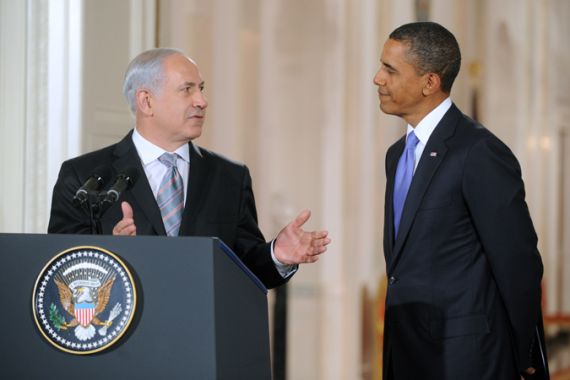US-Israeli relations: Obama back on top?
With the death of Osama bin Laden, President Obama gains political power. But will he use it stand up to Israel?

 |
| President Obama has so far not been able to convince Israeli PM Netanyahu to stop illegal settlement construction in the West Bank – which is one of the main obstacles to peace [GALLO/GETTY] |
On September 12, 2001, the New York Times reported on Binyamin Netanyahu’s reaction to the news of the attacks in New York and Washington:
Asked tonight what the attack meant for relations between the United States and Israel, Benjamin Netanyahu … replied, ”It’s very good.” Then he edited himself: ”Well, not very good, but it will generate immediate sympathy.”
Although Netanyahu immediately “edited” that “it’s very good” reaction, it clearly was an honest response.
His thinking was that, once the US had experienced terrorism, its government would stop criticising Israel for hitting back hard when it was attacked by “terrorists”. And the US would stop implying that Palestinian violence was a result of the occupation of the West Bank and Gaza – and would view it as just as random and nihilistic as an attack by Saudi jihadists on New York and Washington.
And that is exactly what happened. President George W Bush, surrounded by neocon advisers who viewed Arabs the same way the Israeli right did, was happy to conflate 9/11 and the Israeli-Palestinian conflict. The Israelis became us and the Palestinians became al Qaeda. Yasser Arafat, the Palestinian leader who had recognised Israel and worked with Prime Minister Yitzhak Rabin to thwart terrorism, instantly became Osama bin Laden.
It was all so simple
For the rest of Bush’s term, Israeli prime ministers were given free rein to do whatever they wanted to the Palestinians with barely a peep of protest from the White House. There was absolutely no nuance in US policies, no sincere attempt to recognise that – unlike the 9/11 attack on America – the Israeli-Palestinian conflict could not be painted in black and white.
That seemed to change when President Obama came to office. In his Cairo speech in 2009, he reached out to the Arab world and made clear that, in exchange for peace and secure borders, he expected Israel to give up the occupied territories.
But then, nothing. Every effort Obama made to resolve the conflict was blocked by the combination of the Israeli government, the “pro-Israel” lobby, and members of Congress who were organised by that lobby. Ultimately, Obama gave up.
Thus far, the Obama administration has accomplished very little on the Israeli-Palestinian front. Obama turned out to be no more an “honest broker” than George W Bush. The only difference is that, while Bush seemed to believe the “Israel is always right” line, Obama was beaten into submission. He knows better, as everyone who has discussed the issue with the president will attest. He believes that Israel will never know real security until the Palestinians have a viable, independent state. But between the lobby and the donors and members of Congress it speaks for – not to mention White House adviser Dennis Ross – he has been convinced to adopt a hands-off position.
Hope and change?
Until Sunday, there was no reason to expect anything to change before the 2012 election. A politically weak Obama was unlikely to stand up to the donors who demanded he support Netanyahu. The Republicans even invited Netanyahu to address a joint session of Congress where he would enjoy bipartisan adulation following repeated standing ovations at AIPAC. As Netanyahu did with President Clinton, during what appeared to be a Republican ascendancy, Bibi would happily collude with the GOP to get Israel whatever it wanted while working to bring the Democratic president down.
Suddenly, with Osama bin Laden’s death, Bibi’s spring has ended.
Barack Obama is now back on top. Even worse, it is a foreign policy/military triumph that has brought him back. And worse than that, his triumph came from taking out the leading Middle Eastern terrorist in the world.
Now, instead of preparing to come to Washington to strong-arm Obama into pledging absolute rejection of both Palestinian unity and the declaration of a state this fall, Bibi fears that he himself might feel some heat. The president might restate his demand for a settlement freeze, a statement from Israel on final borders, or ask Netanyahu to reconsider his flat-out rejection of negotiations with the newly reunified Palestinians.
He might tell Netanyahu that he intends to lay a US plan on the table with a deadline for Israeli and Palestinian acceptance. He may hint that, in these difficult times, the huge Israel aid package might have to take a hit, alongside all those domestic programs that benefit US citizens.
Who knows? There are a dozen different things Obama could ask of Netanyahu now that the tables have turned.
Obama’s moment
But that doesn’t mean that Obama will. The lobby remains as powerful as ever, its donors as single-minded as ever, and Congress as devoted to pleasing it as ever. Obama might buy into the line – which he will, no doubt, hear from Dennis Ross – that this is no time to upset the Israelis and their friends. Preserve your new capital. Don’t spend even a dime on this.
But Obama should be smarter than that. He will recall that President Kennedy spent the first two years of his presidency trying to prove to the right that he was as tough a Cold Warrior as Republicans, even though he hated the Cold War mindset. But once he triumphed over Khrushchev in the Cuban Missile Crisis, Kennedy was free to be Kennedy. Within months, he delivered the famed American University speech in which he announced his determination to end the Cold War once and for all, explicitly rejecting the idea of military victory over the Soviet Union in the nuclear age as insane. Simultaneously, he reached out to the Soviets, urging concrete actions to ensure that the two nations would never be on the brink of mutual annihilation again.
Kennedy could not have delivered the AU address before the missile crisis or, to put it more realistically, he wouldn’t have. Afterward, he knew he could finally start moving in the direction he had always wanted to move.
Obama is in the same position now. He has never been stronger and, following the revolutionary changes in the Arab world, Netanyahu has never been weaker. The Israeli people want peace. The Palestinians want peace. Everyone knows how to achieve it. And now there is a US president who can deliver it.
Sure, it’s risky. Success is not assured. But neither was it assured when the president gave the order to launch the attack in Pakistan. Compared to the risks Obama took last Sunday, brokering an Israeli-Palestinian agreement is almost risk-free. And, like taking out Osama bin Laden, success would be a critical step toward advancing our own interests, while ensuring both Israel’s security and the Palestinians’ right to statehood.
This is Obama’s moment.
MJ Rosenberg is a Senior Foreign Policy Fellow at Media Matters Action Network. The above article first appeared in Foreign Policy Matters, a part of the Media Matters Action Network.
The views expressed in this article are the author’s own and do not necessarily reflect Al Jazeera’s editorial policy.
